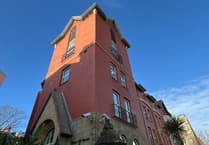The Minister for Enterprise Tim Johnston has said that his department considers a ‘range of factors’ which stall goes where at TT Grandstand site.
The popular TT fan park, which is otherwise known as ‘Trackside’, has a variety of food and drink stalls on offer for visiting and local TT fans every year.
These vendors have to apply for a space at the extremely popular event, with the Department of Enterprise (DfE) then choosing which applications to accept.
Speaking about this process in response to a written question, Mr Johnston said: ‘Once applications are received from prospective traders, each application is considered against a range of factors.
‘These factors include the quality and perceived value of the product relative to the event, the experience of the applicant in working on large scale events, the overall variety of traders in order to ensure a range of choice for customers and the merit of the individual application.’
Agreements with event sponsors may also include the allocation of trade spaces, which also has to be taken into consideration when allocating stalls.
The DfE consider any potential conflict with contractual commitments in order to ‘protect sponsorship value’ and existing income streams.
How much money each applicant has to pay for a stall is also worked out by the DfE, with this also requiring the consideration of certain factors.
Mr Johnston explained: ‘In respect of fees, firstly the DfE calculates the expenditure and operational costs of site set up to ensure that these costs are met as much as possible.
‘The construction of the TT Grandstand site is complex and requires significant temporary infrastructure, and therefore cost, to facilitate all requirements of running the event.
‘This includes the provision of temporary power in the form of generators, fencing, security, refuse collection, land rental and metered water costs.
‘An indicative rate card is also provided as part of the application process, covering different pitch sizes and trader categories, with any final agreed fee adjusted to take into account the activity of the trader and the turnover they expect to be able to generate throughout the event.
‘For example, traders who have a high footfall and output, such as those offering a simple food offering, would expect to generate more business than a specialist low volume food offering or niche product supplier.’
The DfE’s approach towards the allocation of stalls has been developed using industry research across a range of events, while also incorporating knowledge of the TT itself.
Only 13 out of 30 applicants were successful in their applications for a space in 2024.
Two of the successful companies were not from the Isle of Man, while 15 of the 17 unsuccessful businesses were from the island.




